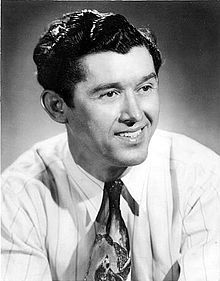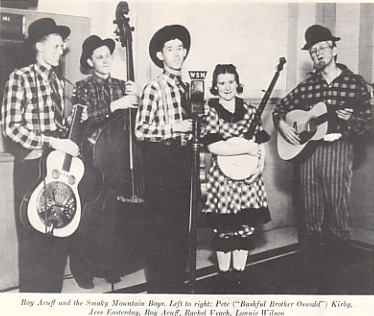Roy Acuff
 Roy Acuff was one of the most traditional of mountain singers. Known as The King of Country Music, he sold more than 30 million records in a career that lasted more than fifty years. The first living member of The Country Music Hall Of Fame, he was a pillar of The Grand Ole Opry. A one-time promising baseball player, he turned to singing in the early 1930s, and with his sincere, mountain-boy vocal style and Dobro-flavoured band sound replaced Uncle Dave Macon as the most popular Opry performer of the 1940s. His success was built mainly on sentimental hillbilly ballads such as Wreck On the Highway, Low and Lonely, Fireball Mail and The Great Speckled Bird. Something of a music visionary, in the early 1940s, together with songwriter Fred Rose, he set up Acuff-Rose, a music publishing company that was destined to become one of the most important in country music. During that same period, Roy’s recordings became so popular that he headed Frank Sinatra in many major music polls, and reportedly caused Japanese troops to yell, ‘To hell with Roosevelt, to hell with Babe Ruth, to hell with Roy Acuff,’ as they banzai-charged at Okinawa. He was also something of a political animal and was nominated to run as governor of Tennessee in 1944 and 1946. Two years later he won the Republican primary, but failed to win the ensuing election. Nevertheless, he did gain tremendous support, earning a larger slice of the vote than any previous Republican candidate. Also, in 1948, he opened the Dunbar Cave resort, a popular folk music park, which he owned for several years. Something of a road warrior, he toured incessantly throughout his career. In 1965 he was seriously injured in a road accident, but was back touring within a few months. He also made several visits to the Vietnam War front to entertain the troops. Adept with a yoyo, he would often play on stage while his band members were taking instrumental solos. At the opening of the new Nashville Opry House in 1974, he was invited to give President Nixon yoyo lessons.
Roy Acuff was one of the most traditional of mountain singers. Known as The King of Country Music, he sold more than 30 million records in a career that lasted more than fifty years. The first living member of The Country Music Hall Of Fame, he was a pillar of The Grand Ole Opry. A one-time promising baseball player, he turned to singing in the early 1930s, and with his sincere, mountain-boy vocal style and Dobro-flavoured band sound replaced Uncle Dave Macon as the most popular Opry performer of the 1940s. His success was built mainly on sentimental hillbilly ballads such as Wreck On the Highway, Low and Lonely, Fireball Mail and The Great Speckled Bird. Something of a music visionary, in the early 1940s, together with songwriter Fred Rose, he set up Acuff-Rose, a music publishing company that was destined to become one of the most important in country music. During that same period, Roy’s recordings became so popular that he headed Frank Sinatra in many major music polls, and reportedly caused Japanese troops to yell, ‘To hell with Roosevelt, to hell with Babe Ruth, to hell with Roy Acuff,’ as they banzai-charged at Okinawa. He was also something of a political animal and was nominated to run as governor of Tennessee in 1944 and 1946. Two years later he won the Republican primary, but failed to win the ensuing election. Nevertheless, he did gain tremendous support, earning a larger slice of the vote than any previous Republican candidate. Also, in 1948, he opened the Dunbar Cave resort, a popular folk music park, which he owned for several years. Something of a road warrior, he toured incessantly throughout his career. In 1965 he was seriously injured in a road accident, but was back touring within a few months. He also made several visits to the Vietnam War front to entertain the troops. Adept with a yoyo, he would often play on stage while his band members were taking instrumental solos. At the opening of the new Nashville Opry House in 1974, he was invited to give President Nixon yoyo lessons.Roy Claxton Acuff was born September 15, 1903, in a three-room shack in Maynardville, Tennessee, the son of a Baptist minister. As a child he learnt jew’s harp and harmonica. Following a move to Fountain City, near Knoxville he started playing minor league baseball and was considered for the New York Yankees. However, severe sunstroke put an end to his career, confining him to bed for much of 1929 and 1930. Following his illness, he hung around the house learning fiddle and listening to old-time players. In early 1932 he joined a travelling medicine show, playing small towns in Virginia and Tennessee. A year later he formed a group, The Tennessee Crackerjacks, in which Clell Sumney played Dobro, providing the distinctive sound that came to be associated with Roy Acuff. He soon gained a regular programme on Knoxville’s WROL. Adopting the name of The Crazy Tennesseans, they moved to the rival Mid-Day Merry-Go-Round show on KNOX. He married Mildred Douglas in 1936, the same year he made his recording debut for ARC (later to become Columbia). Among the first songs he recorded were The Great Speckled Bird and Wabash Cannonball, which would always be associated with him.
He made his first appearance on The Grand Ole Opry in 1938 and soon became a regular. He changed the name of his band to the Smoky Mountain Boys, a name that was to stick, and recruited long time band members Bashful Brother Oswald, Howdy Forrester and Jimmie Riddle. With his Smoky Mountain Boys he did not just perform hillbilly songs, they gave a complete stage show, including vaudeville/minstrel-style skits and slapstick. Over the years he refashioned the band as an old-time string band and added more traditional sounding and religious songs to their repertoire.

He started having unprecedented recording success, his biggest sellers during the early 1940s included Night Train To Memphis, Pins And Needles, Beneath That Lonely Mound of Clay, and The Precious Jewel. He also appeared in several movies including Hi Neighbour, My Darling Clementine, Cowboy Canteen and Sing Neighbour, Sing. It was at this time that he printed and published his own songbooks. Out on the road he soon sold several hundred thousand copies and realised that there was an untapped goldmine in music publishing. He set up Acuff-Rose with Fred Rose, a professional songwriter and pianist working in Chicago, who had enjoyed notable country success with songs like Be Honest With Me and Blue Eyes Crying In The Rain. The publishing company went on to become one of the most famous in the world, publishing songs penned by Hank Williams, Don Gibson, Roy Orbison, The Everly Brothers, Boudleaux and Felice Bryant, John D. Loudermilk and many more Nashville-based writers.
In the early 1950s country music was beginning to undergo changes. Electric guitars, drums and smoother vocalists were creeping into the music, and the older traditional styling of Roy Acuff was not selling. Columbia requested that he change his sound. He was having none of that, and instead changed labels, recording for MGM, Decca and Capitol without any chart success. Through Acuff-Rose he set up Hickory Records and made a modest return to the charts in 1958 with Once More. Though he continued to record prolifically, his record sales were no longer at the peak of the 1940s, though he did score low chart entries with So Many Times, Come and Knock (1959), and Freight Train Blues (1965), and his publishing empire seemed ever-expanding. However, his tremendous contribution to country music was recognised in November 1962 when he became the first living musician to be honoured as a member of the Country Music Hall of Fame.
By the beginning of the 1970s, he decided to cut back on touring, though he did visit the UK for the Wembley Festivals. He guested on The Nitty Gritty Dirt Band’s triple album set, WILL THE CIRCLE BE UNBROKEN in 1972, lending creedence to contemporary and country-rock music. He continued to appear on The Grand Ole Opry throughout the 1970s and 1980s, though by the early 1990s his only appearances were infrequent guest spots at Opryland. Roy Acuff died on November 23, 1992, following a short illness, and was buried just four hours later. He had requested a swift service and burial because he did not want his funeral turned into a circus.
A champion for traditional country values, he was the first country music superstar after the death of Jimmie Rodgers, pioneering an influential vocal style that complemented the spare, simple songs he was performing. Generations of artists have been influenced by Roy Acuff, you only have to listen to the early records by George Jones and Webb Pierce to hear echoes of his mountain twang.
Recommended Listening
The Essential Roy Acuff 1936-1949 (Columbia 1992)
The King Of Country Music (Bear Family 1993)
Once More It’s Roy Acuff/King of Country Music (Ace 2004)
The End of The World (Righteous Psalm 2010)
